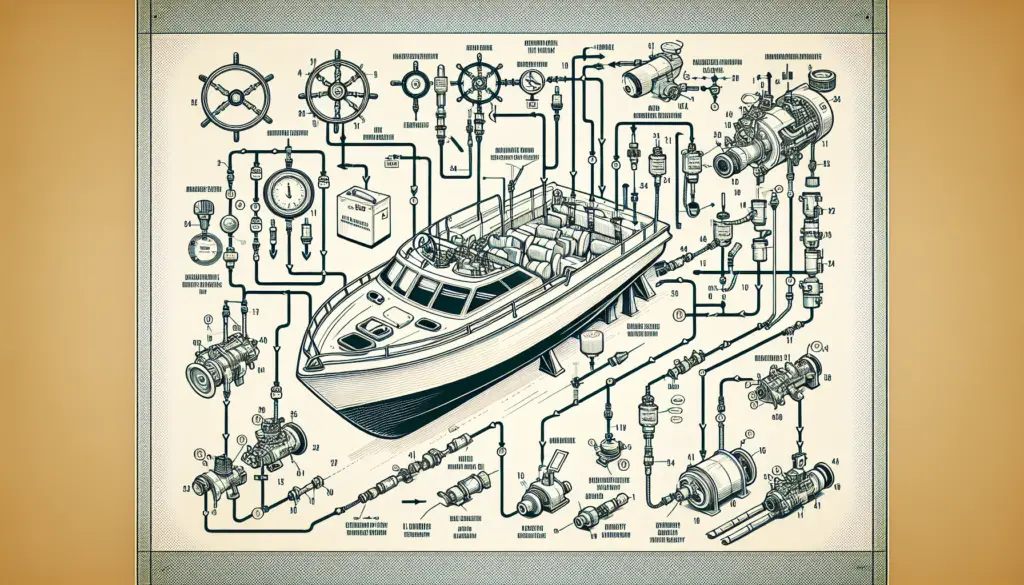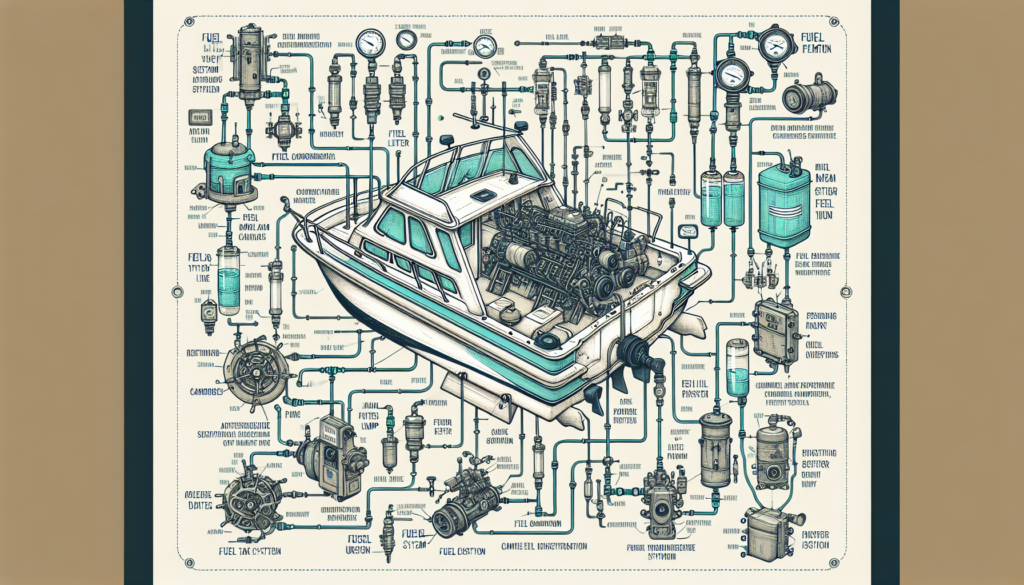Do you own a boat or are you dreaming of owning one soon? Regardless, it’s crucial for you to understand something incredibly important: the health of your vessel’s fuel system. Sail away with us into an ocean of knowledge as we navigate through “Ensuring Proper Fuel System Maintenance For Your Boat Engine”. This article is a treasure trove of practical advice and expert insights that you need to know to keep your boat’s engine running smoothly and efficiently. Remember, your boat is counting on you to prevent any unforeseen issues that can potentially leave you stranded on a beautiful day. So, come explore the necessity of proper fuel system maintenance for your boat engine and ensure your sailing adventures are nothing short of perfect.

Understanding the Importance of Fuel System Maintenance
Maintaining your boat’s fuel system is more vital than you might realize. It’s not just a routine that keeps your boat functioning smoothly, but it also has a significant effect on several aspects of your aquatic adventures.
Impact on Boat Performance
A well-maintained fuel system is essential in optimizing your boat’s performance. Without proper maintenance, various components of the fuel system may deteriorate, impacting the engine’s ability to process fuel efficiently and deliver power. A clogged fuel filter or a leaking fuel line can severely reduce your boat’s pace, hampering your sailing experience.
Impact on Fuel Efficiency
Efficient fuel consumption is another area greatly influenced by your fuel system’s upkeep. A healthy fuel system ensures that every last drop of fuel is optimally used. On the other hand, a poorly maintained system may lead to wasted fuel, frequent refueling, and an increased budget for your boating expenses.
Prevention of Serious Engine Failures
Lack of maintenance can be detrimental to the overall health of your boat’s engine. Issues like contaminated fuel or an overworked pump can trigger more serious problems such as engine stalling or even permanent engine damage. Regular care and maintenance can help highlight potential problems early on, averting any massive repairs or replacements.
Extending the Lifespan of the Boat Engine
Your boat’s engine is a hefty investment and maintaining its fuel system contributes substantially to prolonging its lifespan. Each component of your fuel system plays a critical role in ensuring optimal engine performance and longevity.
Knowing Your Boat Engine
Becoming familiar with your boat engine and its varied components is the first step toward effective maintenance.
Types of Boat Engines
The first distinction you should be aware of is the different types of boat engines. You’ve got your gasoline engines, diesel engines, and outboard motors, each with its unique specifications and maintenance requirements. Understanding your engine type is essential to providing it the appropriate care.
Different Fuel System Components
Your boat’s fuel system isn’t just about the engine. It comprises different components such as the fuel tanks, fuel lines, pumps, and filters. Knowing what each part does and how they work together aids in both troubleshooting and regular maintenance.
Role of Every Component in the Overall Operation
Each component of the fuel system has a vital role in the overall operation of your boat. The fuel tank stores your fuel, while the fuel lines transport it to the engine. The fuel pump helps maintain correct pressure, and the filters help keep the fuel clean. Any hitch in one component could severely hamper the smooth running of all others.
Regular Inspection of the Fuel System
Just like a proper diet and routine check-ups keep you healthy, regular inspection is the key to maintaining your boat’s fuel system’s health.
Importance of Regular Inspection
Routine inspection allows early detection of any minor issues, preventing them from escalating into costly repairs. It ensures your boat operates at its maximum potential and maintains fuel efficiency.
Significant Areas to Check
When performing an inspection, there are some key areas to focus on. These include hoses, connections, fuel tanks, vapor separator tanks, filters, and auxiliary components. During this process, check for leaks, corrosion, or loose connections.
Spotting Potential Issues
Gaining knowledge about common issues in a maritime fuel system can help you spot trouble early on. Some signs of potential problems include inconsistent motor functionality, strange noises, unusual smell, or visible leaks.

Cleaning and Changing Fuel Filters
Fuel filters are akin to kidneys, filtering out impurities and contaminants to keep your fuel clean.
Understanding the Function of Fuel Filters
Fuel filters prevent contaminants from entering the engine. Clean fuel is crucial for engine performance and fuel efficiency. Ignoring the cleanliness of the fuel filter may lead to engine trouble or even serious damage.
Steps in Cleaning Fuel Filters
To clean your fuel filters, begin by relieving the pressure from the fuel system. Remove the filter and wash out the debris. Replace the filter back carefully, ensuring a secure fit. Recharge the fuel system, and check for leaks.
Signs it’s Time to Change Fuel Filters
Some signs show it’s time to change your fuel filters like decrease in engine performance, difficulty in starting the engine, or the engine failing to start at all.
Choosing the Right Fuel Filter Replacement
Selecting the right fuel filter replacement depends on the type of engine your boat has. Always refer to the manufacturer’s manual and guidelines when replacing fuel filters.
Checking and Maintaining Fuel Lines
Fuel lines, effectively the veins of your fuel system, carry fuel from the tank to the engine.
Crucial Role of Fuel Lines
Fuel lines transport fuel seamlessly from the tank into the engine. Even a minute blockage can impact the performance of your boat significantly.
Detecting Leaks and Cracks
Regularly check your fuel lines for any leaks, cracks, or bulges. Even minor leaks can lead to fuel wastage, decreased efficiency and possible fire hazards.
Proper Maintenance of Fuel Lines
Ensure that your fuel lines are clean and securely fitted. It’s good practice to replace fuel lines every couple of years to prevent unexpected leaks or cracks.
Cleaning and Inspecting Fuel Tanks
Your fuel tank is more than just a container for fuel. It’s a crucial component where clean storage ensures an efficient journey.
Critical Role of Fuel Tanks
Fuel tanks need to be clear of dirt or contaminants to provide clean fuel. This directly impacts the performance, economy, and durability of the engine.
Removing Dirt and Contaminants
It’s important to clean your fuel tank regularly. Use professional cleaning solutions to remove any sludge, rust, or microbial growth.
Inspection for Rust and Leaks
Regularly inspect your fuel tank for any signs of corrosion or leaks. Small leaks can quickly escalate into more significant problems.
Fuel Additives and Their Use
Fuel additives are often overlooked but serve a crucial role in the maintenance of your fuel system.
Understanding Fuel Additives
Fuel additives are special blends designed to enhance engine performance, prolong engine life, improve fuel economy and reduce harmful emissions.
Benefits of Using Additives
Additives provide several benefits, such as extending the longevity of the engine, keeping the fuel lines clean, and enhancing the overall performance of your boat.
Correct Use of Fuel Additives
Using the right kind and amount of additive is crucial. Always follow the manufacturer’s instructions when adding fuel additives to your boat’s fuel system.
Managing Water in the Fuel System
Water is a common contaminant that can cause several problems in your fuel system.
Effects of Water in the Fuel System
Water in the fuel can lead to rusting, microbial growth, and significant damage to the engine. It can also negatively impact fuel efficiency.
Preventing Water Contamination
Prevention is always better than cure. Keep your boat covered when not in use, and use high-quality, water-absorbing fuel filters.
Removing Water from the Fuel System
If water does find its way into your fuel system, it’s crucial to remove it promptly. This may involve draining your fuel tank or using specialized additives that help separate water from the fuel.
Preparing the Fuel System for Off-Season
Winterizing your boat or preparing it for a period of inactivity is as important a part of maintenance as any other.
Importance of Winterizing the Fuel System
Proper off-season preparation prevents fuel degradation, resulting in easier start-ups when you’re ready to hit the water again.
Steps in Preparing for Off-Season
There are several steps involved in winterizing the fuel system – cleaning the fuel system, stabilizing the fuel with additives, running the engine to circulate the additive, and topping off the fuel tank.
What to do When the Boat is Out of Use
Even in the off-season, regular checks can prevent any unseen damage. It’s also a good idea to disconnect the battery and store it in a dry, cool place.
Seeking Professional Help
There are times when maintaining your boat’s fuel system requires professional expertise.
When to Call a Professional
If you ever come across a problem you can’t diagnose or if there’s a significant drop in your boat’s performance, don’t hesitate to seek professional help.
Choosing Reliable Engine Service Providers
Always choose a boat maintenance service that’s reliable and experienced. Check reviews and recommendations, and ensure they specialize in your type of boat engine.
Ensuring Quality of Service
Ensure that your service provider delivers quality service. They should explain to you clearly what repairs are being performed and ensure all your concerns are addressed.
That, in a nutshell, are the reasons, the hows, and the whys of ensuring proper fuel system maintenance for your boat engine. Happy Sailing!

